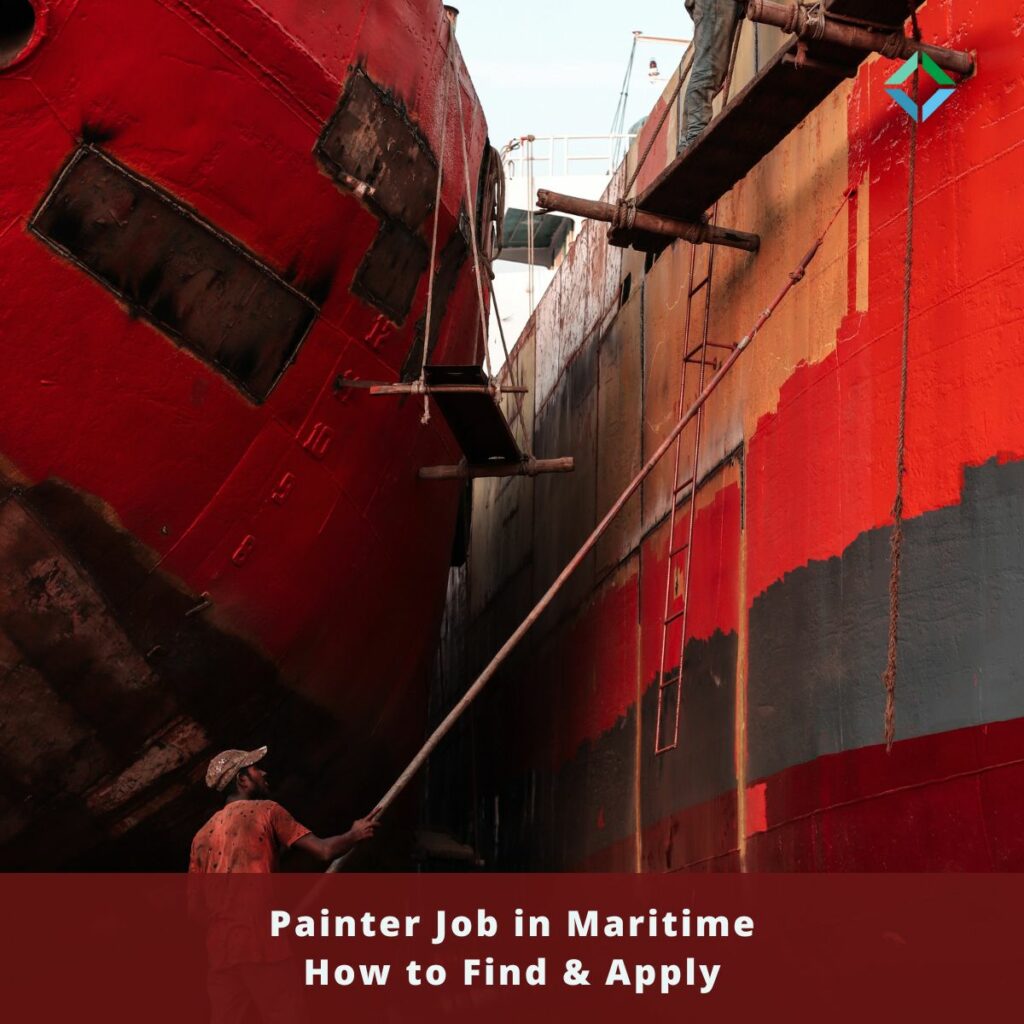Painter Jobs in the Maritime Industry | How to Find & Apply
The maritime industry is a crucial sector that plays a significant role in the global economy. It involves the transportation of goods and people across oceans and seas. The industry comprises various jobs that require different skills and qualifications.
One of these jobs is painter jobs. In this article, we will explore what painter jobs in the maritime industry entail, how to find one, and how to apply.
What Painter Jobs in the Maritime Industry Entail

Painter jobs in the maritime industry are an important part of the maintenance and repair of ships. These jobs require painters to apply paint, varnish, and other coatings to protect the ship's hull, decks, and superstructures from the harsh marine environment. The job can be physically demanding, requiring painters to work in confined spaces, climb ladders, and work at heights. They must also be comfortable working in all types of weather, as ships operate in all weather conditions.
A painter's primary responsibility is to prepare surfaces for painting. This involves removing old paint, rust, and other debris using sandblasting equipment, scrapers, wire brushes, and power tools. Once the surface is clean and smooth, the painter can apply the new coating. The type of coating used depends on the location of the ship and the expected environmental conditions. For example, a ship operating in saltwater will require a different coating than a ship operating in freshwater.
Painters in the maritime industry must have a good understanding of the different types of coatings and their application. They must also be able to mix and match colors to achieve the desired shade and texture. They must follow specific guidelines and instructions to ensure that the coatings are applied correctly and adhere properly to the surface. Painters must also be knowledgeable about the different types of materials used in the maritime industry, such as steel, aluminum, and fiberglass.
Safety is a critical aspect of painter jobs in the maritime industry. Painters must use personal protective equipment, such as respirators, gloves, and safety glasses, to protect themselves from the hazardous chemicals used in the painting process. They must also be aware of their surroundings, as they often work in confined spaces and at heights. Training in safety procedures is essential for all painters in the maritime industry.
In addition to their painting duties, painters in the maritime industry are often involved in other maintenance tasks. They may be responsible for cleaning and maintaining painting equipment, as well as repairing and replacing damaged surfaces. They must be able to work independently and as part of a team, as well as be able to communicate effectively with other crew members.
Skills Required for a Painter Job
Painter jobs in the maritime industry require a unique set of skills and knowledge. As a painter, you will be responsible for painting and maintaining the exterior and interior surfaces of ships, boats, and other vessels. You will also be responsible for preparing surfaces for painting, selecting the appropriate type of paint, and ensuring that the work is completed safely and to a high standard.
In this article, we will explore some of the essential skills required for a painter job in the maritime industry.
- Surface preparation: One of the most critical skills required for a painter job is surface preparation. This involves preparing surfaces for painting by cleaning, sanding, and removing old paint. You will need to be familiar with various surface preparation techniques, including abrasive blasting, power washing, and hand sanding.
- Paint selection: Selecting the right type of paint is crucial to ensuring a long-lasting and durable finish. As a painter in the maritime industry, you will need to be familiar with the different types of paints available, including anti-corrosive coatings, epoxy coatings, and topcoats.
- Paint application: Applying paint is a skill that requires precision, attention to detail, and the ability to work in different conditions. As a painter in the maritime industry, you will need to be able to apply paint using various techniques, including spraying, rolling, and brushing.
- Safety: Safety is a top priority in the maritime industry, and painters need to be aware of the hazards associated with their work. This includes understanding the proper use of personal protective equipment, working at heights, and working in confined spaces.
- Color matching: Color matching is an essential skill for painters, particularly in the maritime industry. Ships and boats often require custom colors or specific color schemes, and painters need to be able to match colors accurately.
- Attention to detail: Attention to detail is essential for painters, as even small imperfections can have a significant impact on the appearance and longevity of the finish. You will need to be able to identify and correct any imperfections in the surface before applying paint.
- Communication: Effective communication is essential for painters, as they often work as part of a team and need to communicate with other professionals, including engineers, project managers, and other painters.
- Time management: Painters need to be able to manage their time effectively, particularly when working on large projects with tight deadlines. You will need to be able to prioritize tasks, work efficiently, and meet project deadlines.
How to Find Painter Jobs in the Maritime Industry
Finding painter jobs in the maritime industry can be a challenging task. However, there are several ways to increase your chances of finding and securing a position in this field.
Here are some tips on how to find painter jobs in the maritime industry.
- Utilizing online job boards: There are several online job boards that cater to the maritime industry, such as Vesseljoin, Indeed, and LinkedIn. These websites offer a variety of job postings, including painter jobs in the maritime industry. Job seekers can browse through the listings and apply for positions that match their skills and qualifications.
- Checking company websites: Many maritime companies have websites where they advertise job openings. It's a good idea to regularly check the websites of companies that operate in the areas where you'd like to work. You can also submit your resume and cover letter directly through these websites.
- Networking: Networking can be a valuable tool for finding painter jobs in the maritime industry. You can attend job fairs and industry events to meet potential employers and learn about job opportunities. You can also join professional organizations, such as the International Marine Contractors Association, to network with other professionals in the field.
- Working with a recruiter: Recruiting agencies specialize in matching job seekers with employers. These agencies have relationships with maritime companies and can help you find painter jobs in the maritime industry. You can submit your resume to a recruiter who will match you with available positions.
- Applying directly: You can also apply for painter jobs in the maritime industry directly with the companies that interest you. This involves researching the companies that operate in the areas where you'd like to work and submitting your resume and cover letter directly to them.
Tips for Applying for Painter Jobs in the Maritime Industry
Applying for painter jobs in the maritime industry can be a competitive process. Therefore, it's essential to take the time to prepare and present yourself in the best possible light.
Here are some tips for applying for painter jobs in the maritime industry.
- Update your resume: Your resume is often the first impression a potential employer will have of you. It's essential to ensure that it's up-to-date, accurate, and highlights your relevant experience and skills. Be sure to include any painting certifications or training you have received.
- Write a customized cover letter: A well-written cover letter can set you apart from other applicants. It's an opportunity to explain why you're interested in the position and how your skills and experience align with the requirements of the job. Customize your cover letter for each job you apply for to show your interest in the position.
- Research the company: Before applying for a painter job in the maritime industry, research the company you're interested in. Find out about their history, mission, and values. This information can help you tailor your application to match the company's culture and needs.
- Obtain necessary certifications: Many painter jobs in the maritime industry require specific certifications, such as the Maritime Training Certificate. It's essential to research the certifications required for the positions you're interested in and obtain them before applying.
- Prepare for the interview: The interview process for painter jobs in the maritime industry can be rigorous. It's essential to prepare thoroughly by reviewing your resume and cover letter and researching the company. You should be prepared to answer questions about your experience, skills, and safety procedures.
- Demonstrate your skills: During the application process, you should showcase your painting skills. You can do this by including examples of your work in your application, such as photos or a portfolio.
- Follow up: After submitting your application, it's essential to follow up with the employer to show your interest in the position. This can be done by sending a thank-you note after an interview or reaching out to the employer to inquire about the status of your application.
- Be patient: The hiring process for painter jobs in the maritime industry can be lengthy. It's essential to be patient and follow up with potential employers to stay informed about the status of your application.
How to Best Prepare for the Interview
Preparing for an interview for a painter job in the maritime industry is crucial to landing the position. It is an opportunity to showcase your skills, experience, and enthusiasm for the role. Here are some tips on how to best prepare for the interview.
- Research the company: Before the interview, research the company and familiarize yourself with their operations, history, and values. This information can help you tailor your responses to show how you can add value to the organization.
- Review the job description: Review the job description and identify the skills and experience required for the role. Make a list of your qualifications that match the job requirements, and be prepared to discuss how you can use them to excel in the position.
- Practice your responses: Anticipate the questions the interviewer may ask and practice your responses. This can help you be more confident during the interview and provide thoughtful, articulate answers.
- Highlight your experience: During the interview, highlight your experience and skills related to painting. Provide examples of how you have handled challenging situations and how you have contributed to the success of previous painting projects.
- Demonstrate your safety knowledge: Safety is a critical component of painting jobs in the maritime industry. Be prepared to discuss your knowledge of safety regulations and your commitment to maintaining a safe working environment.
- Dress appropriately: Dress professionally for the interview, as it demonstrates your seriousness and commitment to the position.
- Ask questions: The interview is an opportunity for you to learn more about the position and the company. Ask questions about the job responsibilities, company culture, and any concerns you may have.
- Follow up: After the interview, follow up with a thank-you note or email to express your appreciation for the opportunity. It also provides an opportunity to reiterate your interest in the position.
Preparing for an interview for a painter job in the maritime industry is critical to securing the position. Researching the company, reviewing the job description, practicing your responses, highlighting your experience, demonstrating your safety knowledge, dressing appropriately, asking questions, and following up can help you stand out as a top candidate. With these tips, you can approach the interview with confidence and increase your chances of landing your dream sea job in the maritime industry. Whether you are a seasoned painter looking for a new challenge or just starting in your painting career, the maritime industry offers exciting opportunities for career growth and advancement.
Advise
If you are a painter working in the maritime industry, you may be wondering how to advance your career and move up the career ladder. Fortunately, there are several strategies you can use to succeed and progress in your career path.
- Acquire relevant skills and certifications: To advance your career in the maritime industry, it is essential to acquire relevant skills and certifications. This includes certifications such as the International Maritime Organization's (IMO) International Paints and Protective Coatings course, which covers topics such as surface preparation, paint application, and safety. Additionally, you may consider pursuing additional training in areas such as corrosion control, project management, and safety.
- Build a network: Networking is an essential part of career advancement. Attend industry events, conferences, and seminars to meet other professionals in the maritime industry. This can help you build relationships, learn about new job opportunities, and gain valuable insights into industry trends.
- Seek out opportunities for career advancement: If you want to move up in your career as a painter in the maritime industry, you need to be proactive in seeking out opportunities for career advancement. This may involve taking on new responsibilities, pursuing leadership roles, or seeking out promotions within your current organization.
- Focus on your job performance: Your job performance is one of the most critical factors in your career advancement. Be sure to focus on delivering high-quality work, meeting deadlines, and exceeding expectations. This can help you stand out as a top performer and increase your chances of being considered for promotions or new job opportunities.
- Stay up-to-date with industry trends: The maritime industry is continually evolving, and it is essential to stay up-to-date with industry trends and developments. This can help you identify new job opportunities, stay ahead of the competition, and ensure that you are equipped with the latest skills and knowledge.
- Develop a career plan: Developing a career plan is a crucial step in advancing your career as a painter in the maritime industry. Set clear goals for your career path, identify the skills and experience you need to achieve those goals, and create a plan to acquire them. Regularly review and adjust your plan as necessary to ensure that you are on track to achieve your career goals.
- Embrace challenges: Embracing challenges is essential to growing in your career. Take on new projects, seek out opportunities to learn new skills, and push yourself outside your comfort zone. This can help you develop new skills, gain valuable experience, and position yourself for career advancement.
- Succeeding and moving up your career path as a painter in the maritime industry requires a combination of skills, experience, and determination. Acquiring relevant skills and certifications, building a network, seeking out opportunities for career advancement, focusing on job performance, staying up-to-date with industry trends, developing a career plan, and embracing challenges can all help you advance your career and achieve your goals. With these strategies, you can position yourself for long-term success in your sea job in the maritime industry.






